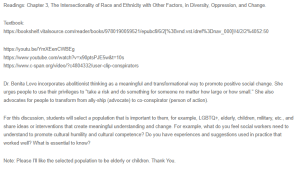Discussion – Abolitionist Thinking
What Social Workers Need to Understand to Promote Cultural Humility and Competence
For this discussion, I chose to focus on the elderly population. It is crucial to appreciate that elderly people experience particular concerns to enhance cultural sensitivity and proficiency in social work. When engaging with the elderly population, social workers must consider how ageism interacts with other aspects of the client’s lives, including their race, ethnicity, and socio-economic status, thereby being culturally sensitive (Reyes, 2022). Programs should be aimed at eradicating prejudices about older adults as being helpless or vulnerable. Social workers must practice reflexivity awareness-wise and enforce constant education processes to eliminate discrimination and increase respect for the personal agency of senior people. For example, involving older adults in decision-making processes or providing culture- and person-specific services are two approaches that are imperative to gain an understanding of the problem and to bring about change.
Experiences and Suggestions that Worked Well in Practice
In practice, engaging older people in decisions around care enhances their feelings of self-reliance and respect, thus providing better results. Furthermore, using translators or culturally appropriate information, especially while communicating sensitive information, has worked well to ensure that service delivery to the elderly is accommodative and appropriate for different cultures. Regularly seeking feedback from elderly clients and their families about their service needs and concerns ensures that the services offered are qualitative and relevant.
What is Essential to Know
It is significant to recognize that older adults are a diverse population with different cultures, experiences, and needs, and therefore, it is crucial to respect them. This is why it is essential to comprehend how ageism overlaps with other types of prejudice, for example, racial or socioeconomic disadvantage (Holman & Walker, 2020). Moreover, understanding and appreciating elders’ culture, communicating with them effectively, and embracing an environment of professionalism in one’s practice is fundamental in supporting this demography group.
References
Holman, D., & Walker, A. (2020). Understanding unequal ageing: towards a synthesis of intersectionality and life course analyses. European Journal of Ageing, 18(2). https://doi.org/10.1007/s10433-020-00582-7
Reyes, L. (2022). Experiences of Civic Participation Among Older African American and Latinx Immigrant Adults in the Context of an Ageist and Racist Society. Research on Aging, 016402752210942. https://doi.org/10.1177/01640275221094288
ORDER A PLAGIARISM-FREE PAPER HERE
We’ll write everything from scratch
Question
Readings: Chapter 3, The Intersectionality of Race and Ethnicity with Other Factors, in Diversity, Oppression, and Change.
Textbook:
https://bookshelf.vitalsource.com/reader/books/9780190059521/epubcfi/6/2[%3Bvnd.vst.idref%3Dnav_000]!/4/2/2%4052:50
https://www.c-span.org/video/?c4804332/user-clip-conspirators

Discussion – Abolitionist Thinking
Dr. Benita Love incorporates abolitionist thinking as a meaningful and transformational way to promote positive social change. She urges people to use their privileges to “take a risk and do something for someone no matter how large or how small.” She also advocates for people to transform from ally-ship (advocate) to co-conspirator (person of action).
For this discussion, students will select a population that is important to them, for example, LGBTQ+, elderly, children, military, etc., and share ideas or interventions that create meaningful understanding and change. For example, what do you feel social workers need to understand to promote cultural humility and cultural competence? Do you have experiences and suggestions used in practice that worked well? What is essential to know?
Note: Please I’ll like the selected population to be elderly or children. Thank You.

